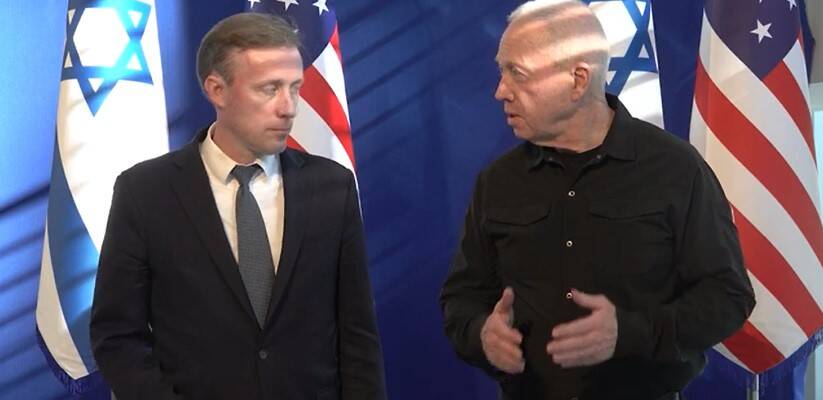Gallant expressed appreciation to the US for supporting Israel’s goals in the war against Hamas.
By Yaakov Lappin, JNS
Israeli Defense Minister Yoav Gallant told visiting U.S. National Security Advisor Jake Sullivan on Thursday that the war against Hamas in Gaza will continue for several months during discussions held at Defense Ministry Headquarters in Tel Aviv.
Gallant told Sullivan that Hamas “is a terrorist organization that built itself over a decade to fight Israel and built infrastructure under the ground and above the ground, and it is not easy to destroy them. It will require a long period of time; it will last more than several months, but we will win, and we will destroy them [Hamas]. So thank you once again for coming to Israel, for helping us and for supporting us.”
During their meeting, Gallant and Sullivan discussed operational developments in the Gaza Strip and at the border with Lebanon, as well as the need to enable Israeli citizens to return to their homes in the north, according to the Defense Ministry.
“They also discussed various threats in the Middle East region, including Iranian aggression via its proxies in Lebanon, Yemen, Iraq, and Syria,” stated the Ministry.
Gallant emphasized that the State of Israel will support international efforts in countering naval threats and will defend itself against any threat.
He expressed his deep appreciation to the U.S. administration “for the ongoing support provided to the State of Israel in its efforts to return home the hostages, and to achieving its operational goal of dismantling the Hamas terrorist organization,” the Ministry said.
“It is not easy to take a democracy into war, but once we are in the war, we will prevail because we are fighting for the right issues and for the right values. Thank you for standing side by side with us,” said Galant.
‘Maximum efforts to preserve hostages’
Israel Defense Forces Spokesman Rear Adm. Daniel Hagari said on Thursday that the IDF and Shin Bet have employed a new underground warfare technique involving the planting of explosives in tunnels and setting them off when Hamas terrorists passed by, killing them.
“We identified them with a camera and eliminated several terrorists. The terrorists chose to hide in tunnels under civilians. We have new combat techniques that we will use to kill terrorists. We will enter and plant explosives, and wait for the right moment to detonate them,” said Hagari.
“This causes terrorists to understand they will not be safe underground. It is one of many means Israel has. The goal is to bring terrorists up [to the surface],” he added.
“We have to ensure we are also making maximum efforts to preserve hostages at the same time,” he stressed.
IDF Chief of Staff Lt. Gen. Herzi Halevi met Golani Brigade members in the field on Thursday, two days after the military announced that the brigade lost nine of its soldiers and officers. The Golani Brigade is currently fighting in Shujai’yya and Zeitoun in northern Gaza, and is “continuing to make achievements and eliminate terrorists,” said Hagari. “The goal is to weaken and eliminate the threat on the other side of the border to allow residents to return to their homes,” he added.
“Today is the anniversary of Hamas’s founding [in 1987]. We saw today tens of Hamas terrorists emerging from a Jabaliya hospital surrendering to the IDF and Shin Bet. This is what its anniversary looks like,” Hagari said. “We have many goals to achieve and difficult battles lie ahead. We will continue to deepen our fighting.”
He recalled that 135 hostages kidnapped on Oct. 7 are still being held in Gaza.
In Judea and Samaria, the IDF has launched tens of operations to apprehend terrorists and seize weapons, including large-scale operations in Jenin.
Also on Thursday, the IDF stated that the Israeli Air Force’s Cooperation Unit conducted more than 500 attacks in the past week, using attack helicopters and UAVs as part of close air-ground cooperation in Gaza. The attacks are guided by continuous intelligence, the IDF stated.
The IAF’s Cooperation Unit is in charge of leading the coordination between the ground and air forces; together, they use firepower to eliminate terror squads and destroy lookout positions, weapons storage centers, tunnel shafts and other types of Hamas terrorist infrastructure.
‘Violating U.N. Security Council Resolution 1701’
In the north on Thursday, fighter jets and tanks struck a series of Hezbollah targets in Southern Lebanon in response to attacks from that area, Hagari said.
Earlier in the day, a terrorist cell operating in the area of Shtula attempted to launch an anti-tank missile at Israeli territory. IDF soldiers struck the terrorist cell, the military said. In addition, IDF tanks struck Hezbollah terrorist infrastructure in Lebanon.
In addition, following sirens sounding in northern Israel, launches were identified from Lebanon towards the area of Yiftah and Margaliot in northern Israel, which fell in open areas. No injuries were reported. The IDF struck the sources of the fire. IDF artillery also struck several areas in Lebanon.
Since Oct. 7, Hezbollah fired hundreds of rockets and missiles from Lebanon towards Israel, the IDF said, adding that this included barrages of up to eight rockets in the past week.
“Overall, approximately one in five rockets fired by Hezbollah since Oct. 7 towards Israel have fallen inside Lebanese territory. Hezbollah’s rocket attacks harm Israeli and Lebanese civilians alike,” said the military. “By continuing to operate, and fire projectiles and UAVs from Southern Lebanon at Israel, Hezbollah is violating U.N. Security Council Resolution 1701. The IDF will continue to defend Israel’s northern border from any threat.”
